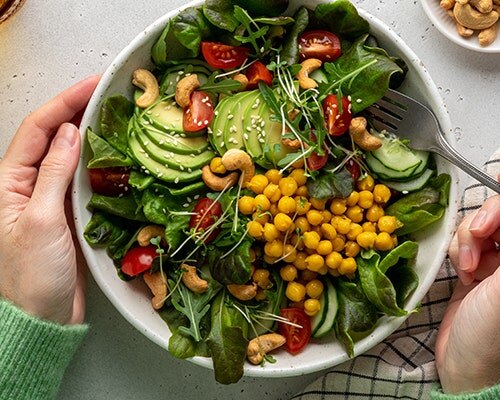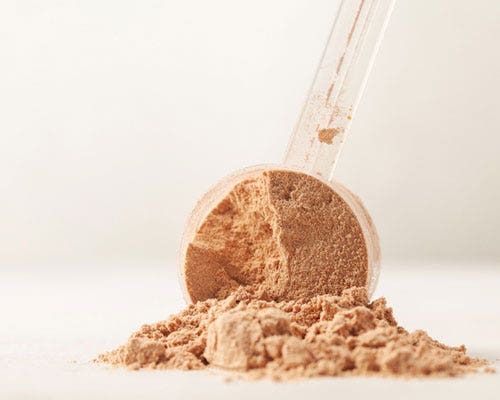Supporting Collagen Production with Vegan Foods
- 3/20/23


Collagen is a wildly popular nutrition topic for good reason. It’s the most abundant protein in our bodies and is responsible for providing the structure in bones, blood vessels, joints, muscles, skin, and more. Without it, our framework would quite literally fall apart.
As we age, we produce less collagen and gradually lose the youthful strength of these organs. On the inside, parts like bones and joints begin to wear down, reducing our physical abilities. On the outside, our skin loses its elasticity, showing signs of aging.
Luckily, some research indicates that adding collagen to the diet can help maintain the health of our structural lattices. But since collagen comes only from animal sources, what can people following vegan diets do to boost collagen production?
Plant-Based Collagen Boosters
Because collagen is a protein found within animal parts, supplements and foods that contain it are not plant-based. However, plenty of plant foods can help your body make its own collagen. Certain amino acids, vitamins, and minerals all play roles in building protein, and they can all be found in a diversified vegan diet.
Amino Acids
The human body is capable of some pretty miraculous feats, including making its own collagen from protein fragments called amino acids. But just as we use special ingredients to bake bread, our bodies need the right amino acids to make collagen proteins.
Collagen consists of a wide variety of amino acids, but it’s unusually high in the amino acid building blocks glycine and proline. While the body can make some glycine and proline independently, it may not be enough to keep up with collagen production.
Several plant foods provide glycine and proline, including asparagus, black beans, cabbage, cashews, chia seeds, kidney beans, mushrooms, peanuts, pistachios, pumpkin seeds, seaweed, soybeans, and sunflower seeds.
Vitamin C
This little nutrient is a favorite of many, conjuring happy images of bright, sunny citrus fruit. One important role of vitamin C is that it’s needed to combine collagen proteins to form strong links. Without vitamin C, humans develop a disease called scurvy, in which the collagen bits fall apart.
Oranges aren’t the only food high in vitamin C. Many fruits and vegetables are excellent sources of the nutrient, including broccoli, brussels sprouts, cabbage, cantaloupe, green and red sweet peppers, kiwifruit, strawberries, and tomato juice.
Zinc
Zinc is a mineral found in many plant foods, and scientists say it's needed for collagen production in a roundabout way. The nutrient triggers certain proteins in the body to make collagen proteins and also helps stimulate specialized enzymes to reconstruct damaged collagen.
You can get zinc in your plant-based diet by including broccoli, brown rice, chickpeas, kidney beans, lentils, oatmeal, peanuts, and pumpkin seeds.
Manganese and Silicon
Manganese and silicon are two more minerals that boost collagen production indirectly. For example, manganese is needed to activate the use of the amino acid proline, mentioned above.
Silicon is in the beginning stages of study for its usefulness in collagen synthesis. As one of the most abundant minerals on earth, it’s widely found in the body. Scientists think it’s especially important in forming collagen in bones, helping to maintain bone strength.
Plant sources of manganese include brown rice, coffee, leafy vegetables, nuts, soybeans, tea, and whole grains. Silicon sources include bananas, beets, green beans, and whole grains.
The Bottom Line
While collagen itself is not vegan, people who choose a vegan diet can still get the building blocks they need to make their own collagen. Plant foods are loaded with nutrients and can provide the amino acids, vitamins, and minerals needed to boost collagen production, offering vitality for your entire body.
While a well-rounded, healthy diet should always be the first step toward good nutrition, sometimes supplements are needed to fill in the gaps. Garden of Life offers an Organic Plant Collagen Builder, made only from organic plant foods, that supports the body’s own natural production of collagen.†
Resources:
-
Wu M, Cronin K, Crane JS. Biochemistry, Collagen Synthesis. [Updated 2022 Sep 12]. In: StatPearls [Internet]. Treasure Island (FL): StatPearls Publishing; 2022 Jan-. Available from: https://www.ncbi.nlm.nih.gov/books/NBK507709/
-
Varani, J., Dame, M. K., Rittie, L., Fligiel, S. E. G., Kang, S., Fisher, G. J., & Voorhees, J. J. (2006). Decreased collagen production in chronologically aged skin: roles of age-dependent alteration in fibroblast function and defective mechanical stimulation. The American Journal of Pathology, 168(6), 1861–1868.
-
Choi, F. D., Sung, C. T., Juhasz, M. L. W., & Mesinkovsk, N. A. (2019). Oral Collagen Supplementation: A Systematic Review of Dermatological Applications. Journal of Drugs in Dermatology: JDD, 18(1), 9–16.
-
Khatri, M., Naughton, R. J., Clifford, T., Harper, L. D., & Corr, L. (2021). The effects of collagen peptide supplementation on body composition, collagen synthesis, and recovery from joint injury and exercise: a systematic review. Amino Acids, 53(10), 1493–1506.
-
Wu, M., Cronin, K., & Crane, J. S. (2022). Biochemistry, Collagen Synthesis. StatPearls Publishing.
-
de Paz-Lugo, P., Lupiáñez, J. A., & Meléndez-Hevia, E. (2018). High glycine concentration increases collagen synthesis by articular chondrocytes in vitro: acute glycine deficiency could be an important cause of osteoarthritis. Amino Acids, 50(10), 1357–1365.
-
FoodData central. (n.d.). Retrieved January 19, 2023, from https://fdc.nal.usda.gov/
-
Vitamin C. (n.d.). Retrieved January 18, 2023, from https://ods.od.nih.gov/factsheets/VitaminC-HealthProfessional/
-
Zinc. (n.d.). Retrieved January 19, 2023, from https://ods.od.nih.gov/factsheets/Zinc-HealthProfessional/
-
Fung EB, Kwiatkowski JL, Huang JN, Gildengorin G, King JC, Vichinsky EP. Zinc supplementation improves bone density in patients with thalassemia: a double-blind, randomized, placebo-controlled trial. Am J Clin Nutr. 2013;98(4):960-971. doi:10.3945/ajcn.112.049221
-
Manganese. (n.d.). Retrieved January 19, 2023, from https://ods.od.nih.gov/factsheets/Manganese-HealthProfessional/
-
Farooq, M. A., & Dietz, K.-J. (2015). Silicon as Versatile Player in Plant and Human Biology: Overlooked and Poorly Understood. Frontiers in Plant Science, 6, 994.
-
Price, C. T., Koval, K. J., & Langford, J. R. (2013). Silicon: a review of its potential role in the prevention and treatment of postmenopausal osteoporosis. International Journal of Endocrinology, 2013, 316783.
-
Digging a vegetarian diet. (2017, June 27). NIH News in Health.




